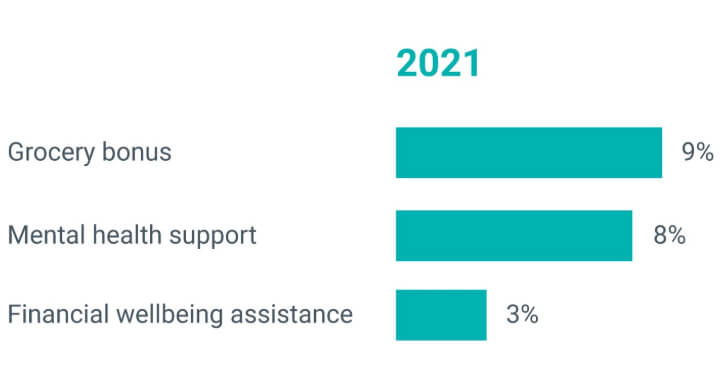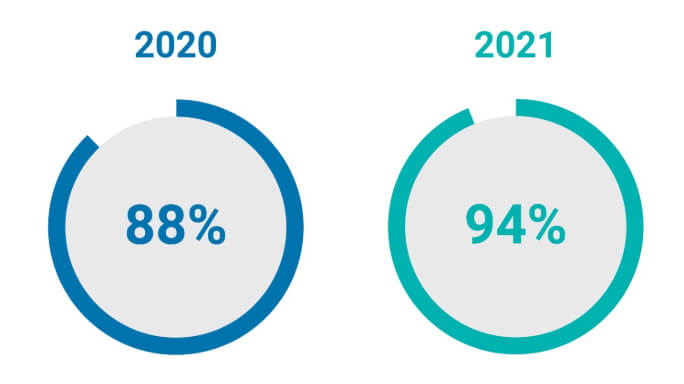GBCI 2021: Why should employee wellbeing matter?

In June, we published our annual Global Business Complexity Index (GBCI) report, providing an authoritative overview of the complexity of establishing and operating businesses around the world. Examining 292 indicators across legislation, compliance, accounting, tax, human resources and payroll, our report publishes a global ranking of 77 key jurisdictions based on the complexity of their business environments.
This follow-up article focuses on HR and payroll, exploring questions around employee wellbeing and why it should matter.
The general tendency towards more progressive employee support, combined with a greater level of awareness of work-related mental health issues, has seen greater care for employees increasingly become both culturally expected and legally mandated. To an extent, the Covid-19 pandemic has drawn further attention to the importance of caring for your workforce through difficult circumstances. Those working in HR and payroll in many jurisdictions are now having to deal with increasingly complex requirements in order to comply with additional regulations regarding the adequate support of employees.
The Covid-19 crisis has cast a light on the need for employee support more than ever before.
In early 2020, the way we lived and worked completely changed almost overnight, due to the significant impact the coronavirus was having on societies and economies around the world. The world’s businesses and their employees were directly affected, with organisations needing to consider how to best support their workers while acclimatising to the new normal. The pandemic brought uncertainty on an almost unprecedented scale, meaning that the role of HR services shifted within many businesses. One of the lasting consequences is that companies are now ensuring not only that they provide an adequate and legally compliant payroll and HR function, but also considering how they are supporting employees.
The research for this year’s GBCI report explored the pandemic and how it has impacted the HR and payroll space. It uncovered a range of different approaches across the jurisdictions surveyed, on how businesses and governments were supporting their workforces during this challenging time. We found that many governments around the world had introduced protectionist measures to assist businesses so that they could retain as many employees as possible. In Singapore, for instance, a significant Jobs Subsidy Scheme (JSS) was introduced that provided 10-75% wage subsidies to employers (subject to caps). This protected employees across different sectors and industries, but notably those most vulnerable to the impacts of the pandemic.
Governments in other jurisdictions have taken a slightly different approach: imposing sanctions on companies that fail to protect their employees during the pandemic. For example, in Venezuela, the LOPCYMAT (Ley Orgánica de Prevención, Condiciones y Medio Ambiente de Trabajo) law works to ensure that companies with staff working in their establishments, or office, comply with the security measures related to the Covid-19 pandemic. If businesses do not comply, they will be issued with a warning and if non-compliance persists, sanctions are imposed.
So, the pandemic has brought challenges for HR departments within organisations globally. Whether this is through having to complete additional documentation in order to access employee support schemes, or ensuring best practice in the workplace to avoid sanctions, any new measures brought in to protect employees during the pandemic have increased the responsibilities of businesses. Although it is positive to see that workers are being protected and supported by governments, there’s no doubt that such schemes have added complexity for those working in HR and payroll, during what has been a very challenging time.
With working from home the “new normal” in many sectors, employee support is changing
The rapid increase in employees working from home is also adding to the burden of complexity within the HR and payroll space. The pandemic has led to an exponential rise in the number of organisations offering their staff the ability to work from home, or being mandated to do so. In certain jurisdictions, governments are putting additional measures in place to help to facilitate this for employees, which can also require companies to offer practical support. For example, in China discussions are currently underway over companies offering workstation and internet expenses while employees continue to work from home.
Organisations are encountering further complications with remote working, as they move to roll out hybrid or flexible working models for employees. Additionally, organisations with international workforces may be exposed to non-compliance risk, should employees seek to use remote working to allow them to live and work in a jurisdiction other than that of their usual place of work. Offering this level of flexibility could benefit organisations, for example, by helping them to retain existing talent or allowing them to expand their talent pool globally, perhaps to locations where the cost of recruiting is lower. However, these benefits could come at a cost: establishing and managing such cross-border HR and payroll considerations adds complexity.
Certain jurisdictions are increasing employee wellbeing requirements, and placing this on the agenda for businesses.
Alongside growing complexity for those working within HR and payroll resulting from the pandemic, employee wellbeing requirements are on the rise as jurisdictions in many regions move towards a more caring, employee-centric work culture.
Data from the GBCI 2021 reflects this work culture trend, as it revealed a rise in paid time off for employees when compared with the previous year (94% in 2021, compared with 88% in 2020). This coincides with a trend seen in many jurisdictions, of placing more focus on work-life balance and the mental health of employees. Adequate time off allows employees to properly rest and relax, helping them to avoid burnout and other mental health issues associated with prolonged or high levels of stress.
Percentage of jurisdictions where paid time off for permanent employees is legally required
The GBCI 2021 also explored more non-conventional benefits mandated for permanent employees and found that, although it’s very much in the minority, some jurisdictions are starting to offer employees more progressive support. For instance, 8% of jurisdictions globally now require that organisations offer their permanent employees mental health support. With a growing focus on mental health issues around the world, this number may well rise in the coming years.

Benefits legally required to be offered to permanent employees (% of jurisdictions)
Certain jurisdictions lead the way when it comes to employee support, such as Finland, where an employer must offer occupational healthcare to all of their employees by law. Finland also offers tax-free travel vouchers to employees, up to a value of €3400 per year, and sports and cultural vouchers, which are also a tax-free benefit. This means that employees in Finland can enjoy benefits specifically designed to enhance their physical, financial and mental wellbeing – something which sets it apart from many other jurisdictions around the world.
While such examples benefit workforces greatly, and even benefit organisations indirectly, policies or incentives such as these do ultimately add to the complexity of a given jurisdiction’s business environment. They represent an additional compliance burden for those working the HR and payroll, who need to ensure that their companies are meeting the requirements of all regulated or mandated benefits.
Improved wellbeing, improved productivity
However, the ultimate benefit of such policies should not be underestimated. According to data collated by the World Economic Forum (Our World in Data) an estimated 275 million people suffer from anxiety disorders. Considering the wide-ranging impact of the pandemic, it’s no wonder that more and more people are in need of support. For workers, such disorders can greatly affect workplace performance, so there is a real need for companies to offer employee support to alleviate any associated difficulties.
It is no longer enough for employers to care for their employees in a traditional sense -expectations are rising, both on the part of workers and an increasing number of governments. Those working in HR and payroll are facing the increased complexity that comes with providing a more supportive working culture, whether by having to manage employees working flexibly or in different countries, or establishing procedures and policies to support the mental wellbeing of employees.
Understand and navigate HR and payroll compliance complexity with the Global Business Complexity Index 2021.






